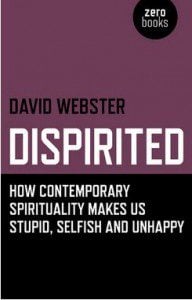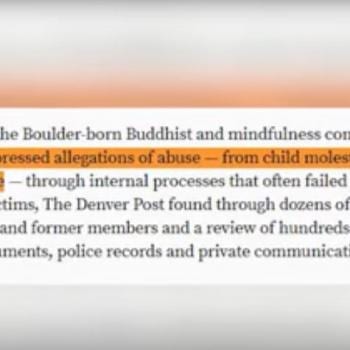 I just finished listening to a podcast interview of my friend David Webster on CBC (Canadian Broadcasting). Knowing Dave, I know that he is a bit (at least) of an admirer of the Slovenian philosopher Slavoj Žižek. My own view of Žižek is not a secret. One of my most popular blog posts last year was a discussion of Žižek, who had recently given a lecture that was, in title at least, about Western Buddhism: “Zizek waxes on about Zionism, Sex, Gangnam Style, Justin Bieber, the Pope, and Buddhism.”
I just finished listening to a podcast interview of my friend David Webster on CBC (Canadian Broadcasting). Knowing Dave, I know that he is a bit (at least) of an admirer of the Slovenian philosopher Slavoj Žižek. My own view of Žižek is not a secret. One of my most popular blog posts last year was a discussion of Žižek, who had recently given a lecture that was, in title at least, about Western Buddhism: “Zizek waxes on about Zionism, Sex, Gangnam Style, Justin Bieber, the Pope, and Buddhism.”
While I’m sympathetic to many of Žižek’s criticisms and aims, I feel that 1) his sloppiness in appropriating Buddhist thought and 2) his narrow ideological bent make him difficult to take too seriously.
While Žižek often speaks in a ‘specialist dialect’ known well only by fellow Lacanian-Marxists, Webster speaks English, proper English English (I even caught an “innit”) in the interview and his writing. An example of Žižek’s, can we say “dogmatism” comes in a recent article in the London Review of Books, in which he concludes:
The proletarianisation of the lower salaried bourgeoisie is matched at the opposite extreme by the irrationally high remuneration of top managers and bankers (irrational since, as investigations have demonstrated in the US, it tends to be inversely proportional to a company’s success). Rather than submit these trends to moralising criticism, we should read them as signs that the capitalist system is no longer capable of self-regulated stability – it threatens, in other words, to run out of control. [emphasis added]
This is reminiscent of Toynbee’s suggestion that Communism remains the last Christian heresy, literally prophesying in this case the end of unfair, irrational economics and the oncoming golden age where each man serves his neighbor and taking never in excess, but only according to his needs. In fairness, Žižek seems more careful than this at times and has, I’m told (see comments here), been criticized heavily by “Orthodox Marxists” for failing to be dogmatic enough.
Webster at this point is still much less well-known, which no doubt saves him a lot of this grief. But it also, perhaps, allows him to speak “our” language and talk about “our” problems in a more coherent and useful way. As a University lecturer, Dave is a “lower salaried bourgeoisie” (I think), meaning that he is in the world of people who, in olden days, would have been quite well-off, though not by any means rich and powerful. These days, Žižek rightly observes once you get beyond the jargon, people in lower and even middle-range professions no longer have that sense of security that they would have even 30 years ago.
The problem, turning to Spirituality and Buddhism, is that these can be mere distractions from the real problems in the world. It is very sick, but it is also true that many people getting “irrationally high remuneration” are doing no good in the world and actually contributing quite substantially to human suffering. It doesn’t take a conspiracy theory or dogmatic ideology to see this, and much to the liberal’s disappointment, Obama in America has done very little (or nothing) to prosecute the those who stole from the poor and the middle to fatten the wallets of the wealthy. Meanwhile, people are not looking squarely at these and other problems and fighting to correct them, but are instead pouring their time and money into new spiritual practices, quite often including aspects of Buddhism.
We don’t complain to our managers (and union reps) when our job becomes overly demanding and pay and benefits are cut. Instead we join a meditation group or pick up yoga or talk to a psychic, or all three.
Webster suggests that traditional religions at least encourage commitment, an important virtue in contemporary life where this “buffet style”
spirituality allows one to become lost in endless choices and details. Commitment demands a degree of interaction with others, with real human beings, and a kind of self-transformation that is all too lacking in the consumeristic quarters of contemporary spirituality.
However, I find that it is all too often a commitment that comes at the expense of our natural “fellow feeling” (to follow Smith) or “respect” (as Kant put it) for other human beings – the ones outside of our religion. While Webster appreciates this open quest for Truth found within committed religious circles, I am a bit leery of the Truth each one comes up with. So a little lack of commitment or agnosticism is quite okay, as long as you see yourself as trying to go beyond the limits of your faith, from within the faith (if that sounds Hegelian to you, it’s because it is).
Part of my Buddhist-Kantian faith is that Truth is discoverable, but it’s not likely to be found, word for word, in the doctrines and dogmas of any of the World religions (except of course in Buddhism and Kant’s philosophy – j/k). I find myself as something of a committed Buddhist-Kantian, which might suggest to some that I’m not really committed to either, or that I’m committed to both, or, as I like to think of it, committed to each in a mutually critical fashion. In fact I would say that the only true Buddhist was the Buddha, in the sense that everyone else who came to Buddhism brought baggage. If we try to ignore that baggage, as some suggest, we simply become blind to it and it ends up coloring Buddhism for us it its own image. Great Buddhist teachers simply learn to use that baggage to connect Buddhism to similar baggage-carriers.
In any case, for a critique of contemporary spirituality, including much of Western Buddhism, Webster offers a far clearer analysis than Žižek of what is wrong and how to go about fixing it. You can listen to the CBC podcast here or see my full review of Webster’s latest book, Dispirited, here. Dave also recently did an interview with Ted Meissner at the Secular Buddhist – so keep an eye on that site for what is sure to be a more focused discussion.












